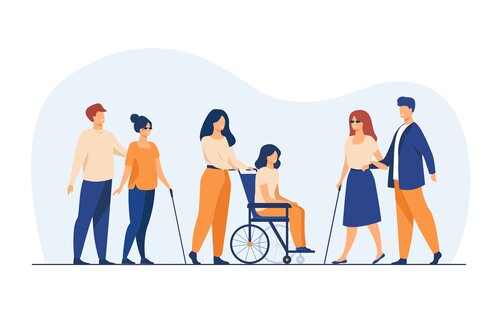If persons with disabilities are not deliberately included in the design of UHC strategies and reforms, will they be left behind?
The Government of Kenya has prioritized universal health coverage (UHC) in its Big 4 agenda over the next 5 years. This resonates with the World Health Assembly 2018 theme: Health for all: Commit to Universal Health Coverage. The focus of UHC is on preventable and primary health care as emphasized in the Alma-Ata principles plus a centrality of reproductive, maternal, neonatal, child and adolescent health being critical to achieving UHC. Last but not least reduction of out of-pocket expenditure is central to achievement of UHC.ding to the Ministry of Education and VSO Jitolee 2016 report, 10% of Kenyans under the age of 21 years have a disability and this is equivalent to 4.4 million citizens. It might sound obvious, but it is worth stating that persons with disabilities have many of the same health needs as the general population.
The statement: ‘’ the attainment of UHC must not be seen as a purely technical objective, but must be accompanied by purposeful redistribution of resources for equitable gains” is squarely summed by the ‘Alma-Ata principles’ as: being accountable and accessible to the people it serves. Universal Health Coverage (UHC) strategies—such as establishing packages of essential health services and implementing health financing reforms is an effort to ensure all citizens have access to basic health care services. Health is increasingly being embraced as the driver of human welfare and sustained economic and social development, but I wonder: If persons with disabilities are not deliberately included in the design of UHC strategies and reforms, will they be left behind? What do we, as a development community, stand to gain if we prioritize disability inclusion?
Persons with disabilities are the world’s largest minority group. According to the Ministry of Education and VSO Jitolee 2016 report, 10% of Kenyans under the age of 21 years have a disability and this is equivalent to 4.4 million citizens. It might sound obvious, but it is worth stating that persons with disabilities have many of the same health needs as the general population.
World Health Organization 2011 World report on disability
According to the World Health Organization 2011 World report on disability, persons with disabilities are more likely to be denied care and have poorer health outcomes than persons without disabilities, even though households in low- and middle-income countries with disabled members spend a third more of their income on health care compared with other households.
Barriers posed by health systems are physical, such as inaccessible buildings and transport; some are institutional, such as inadequate policies, legislation, and information; others are attitudinal, such as health providers often discussing health issues with caregivers rather than the person with disability and not asking for consent before medical procedures.
Health promotion and disease prevention activities hardly target persons with disabilities. Women with disabilities receive fewer cancer screenings and are less likely to be offered family planning than women without disabilities, according to the aforementioned report. Many health facilities lack sign language interpreters, and so Deaf and Hard of Hearing patients struggle to seek, receive, and communicate health information.
Heart of Universal Healthcare Coverage
The heart of UHC is this: that everyone receives the health care they need without suffering financial hardship—and yet persons with disabilities have greater unmet needs for health care than the general population and are 50 percent more likely to suffer from catastrophic health expenditures. The Convention on the Rights of Persons with Disabilities reinforces and strengthens protection for persons with disabilities in relation to health and rehabilitation. It recognizes that persons with disabilities have the right to the highest attainable standard of health and that State parties must recognize that right without discrimination on the basis of disability (Article 25) and further guarantees the right of persons with disabilities to access rehabilitation services of all kinds (Article 26).
Moreover, the Convention recognizes the right of persons with disabilities to access, within their communities, a range of in- home, residential and other support services (Article 19).
The Constitution of the World Health Organization (WHO) also enshrines the highest attainable standard of health as a fundamental right of every human being. The right to health includes access to timely, acceptable, and affordable health care of Appropriate Quality: The right to health means that States must generate conditions in which everyone can be as healthy as possible. It does not mean the right to be healthy.
The Constitution of Kenya, Part 2. Rights and fundamental freedoms; Article 27 on Equality and Freedom from Discrimination:
(4) The State shall not discriminate directly or indirectly against any person on any ground, including race, sex, pregnancy, marital status, health status, ethnic or social origin, colour, age, disability, religion, conscience, belief, culture, dress, language or birth.
(5) A person shall not discriminate directly or indirectly against another person on any of the grounds specified or contemplated in clause (4).
(6) To give full effect to the realization of the rights guaranteed under this Article, the State shall take legislative and other measures, including affirmative action programmes and policies designed to redress any disadvantage suffered by individuals or groups because of past discrimination.
(7) Any measure taken under clause (6) shall adequately provide for any benefits to be on the basis of genuine need.
Kenyans through the UHC Health Benefits Advisory Panel (HBAP) can and must do better. Many of the barriers faced by persons with disabilities in health systems are avoidable with targeted action and attention. We have an opportunity to apply an inclusion lens to all current and emerging UHC efforts and overcome these inequities. The World Bank, The London School of Hygiene & Tropical Medicine, and others have found that excluding persons with disabilities from society hurts the entire economy thus when disability inclusive development is a priority, everyone benefits.
Mwavuna Kazungu

